
‘This chaos is well organized’: Bishop Shomali on Holy Week in the Holy Land
This Easter, it is going to be especially crowded the Church of the Holy Sepulchre.
On Easter Sunday, Bishop William Shomali will join other members of the Latin Patriarchate of Jerusalem in the Church of the Holy Sepulchre.
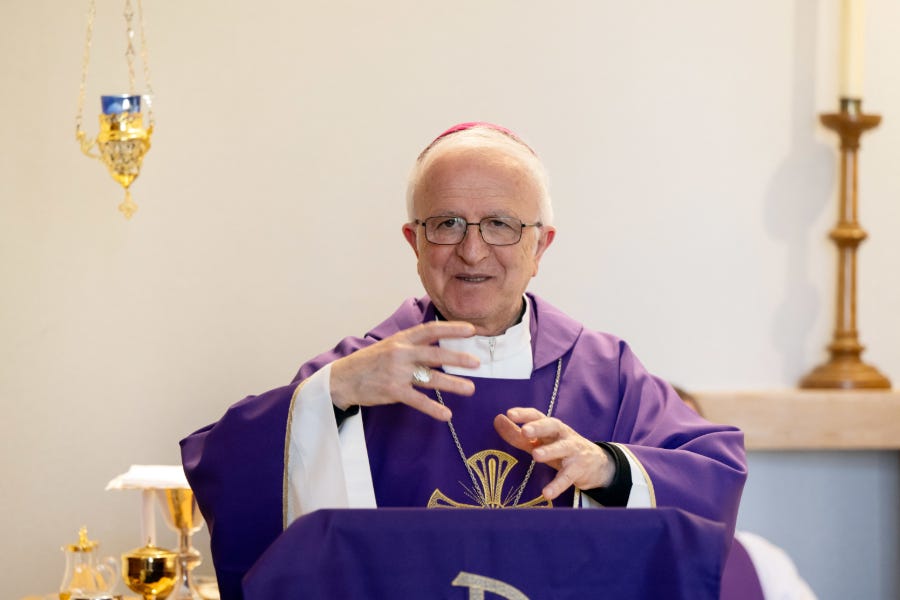
The celebration at the site where tradition holds that Jesus died, was buried, and rose again will be even more resonant this year because both Catholics and Orthodox Christians will be marking it on the same date.
But that coincidence poses more than a few practical challenges, Shomali told The Pillar in an April 1 Zoom interview, because Jerusalem’s diverse Christian communities will be descending on the site at the same time.
Shomali, a gentle, white-haired figure with glasses that magnify his eyes, knows what to expect because he’s been at the church before when the Catholic and Orthodox dates overlapped, most recently in 2017.
The building — a maze of chapels, altars, and shrines — will be teeming with worshipers attending overlapping Easter celebrations. Catholics will rub shoulders with Greek Orthodox Christians, Armenians, Copts, Ethiopians, and Syriacs. Fortunately, there’s a status quo agreement to ensure people do not tread on each other’s toes, metaphorically or literally.
Shomali was born in Beit Sahour, a Palestinian town east of Bethlehem, in 1950. At the age of 22, he was ordained a priest of the Latin Patriarchate, a unique jurisdiction covering Latin Catholics in Israel, Palestine, Jordan, and Cyprus. Over the next 50 years, he held many roles, including those of rector of the Latin Patriarchate Seminary in Beit Jala and chancellor of the Patriarchate.
Today, he is one of the Latin Patriarchate’s four active auxiliary bishops, serving as General Vicar and Patriarchal Vicar for Jerusalem and Palestine against the bloody background of the Gaza war.
The 74-year-old spoke with The Pillar during a visit to the U.K. to meet with supporters of the Latin Patriarchate, including the charity Aid to the Church in Need.
He discussed the “strange paradox” of the Christian presence in the Holy Land, his impressions of Latin Patriarch Cardinal Pierbattista Pizzaballa, and why he’s inundated with WhatsApp messages.
This interview has been edited for length and clarity.
The Latin Patriarchate’s members spread across Israel, Palestine, Jordan, and Cyprus.
Does this mean that it needs to promote peace and reconciliation among its own members, as well as externally?
Yes, we have Christians in Israel. We have Christians in Palestine and in Gaza, but the problem is not between them. We are very friendly with Arab Israelis, and with Palestinian Arabs there are no problems. The problem is political between the governments and the armies.
Practically, Arab Israelis support us in many ways and they consider themselves part of the diocese and we visit them. Next Saturday, I will lead the Via Crucis, the Way of the Cross, for 500 Christians coming from Galilee [in northern Israel].
It is not my territory. I am bishop for Palestine and Jerusalem. But these 500 will come to make the Way of the Cross in the city of Jerusalem this upcoming Saturday. And they asked me to lead the procession, just to say that we are united in prayer and faith without any problems.
Is the number of Catholics in the Latin Patriarchate decreasing due to emigration?
The migration started more than a century ago. Now in the diaspora there are more than one million Christian Palestinians, mainly in Chile, Canada, Australia, and Europe. Another wave continues to leave the country.
But I have something positive to say. Although the percentage of Christians decreases every year, the numbers are keeping on the same level or even increasing a little bit. This is a strange paradox, which comes from the fact that still we have families who bring forth children. Those make up for those who leave.
I’ll give you an example which can explain this paradox. In 1847, when the Patriarchate was reestablished in the Holy Land, the number of Christians was 21,500, with a Palestinian population of 250 only. We were 9% of the total population. These statistics were coming from the French consulate at that time.
Today we are 1%, maybe a little bit more in Israel, a little bit less in Palestine. But the total number of Christians in the Holy Land is 200,000, plus the 100,000 foreign Catholic workers who work in Israel.
So practically between Jordan, Palestine, and Israel, our numbers are around 300,000, while we were only 21,500 in 1847. In the meantime, as I said, one million are in the diaspora and these people left after 1847.
Do those who emigrate retain any ties with the Latin Patriarchate?
We send priests to the United States to serve the Arab American community. We have one priest in Yonkers, New York, another in San Francisco, a third in Los Angeles, a fourth in Chicago, and we have a fifth in San Jose.
So we have five Arab priests from the Latin Patriarchate who serve our Arab American communities in the United States. It means that some connection remains between us, and these people may from time to time support our work.
I am going to visit one of these parishes in May.
I have the occasion to preach a spiritual retreat with a priest of Milwaukee, but I was invited also by the Arab community of Chicago to spend some days with them. I know the parish priest — he was one of my students — and I know some of the parishioners, whom I knew either in the seminary or in our parishes, and who recently left the country. So still some connection exists between us and them.
Will the observance of Holy Week be any different this year for Catholics in the Latin Patriarchate because of the political situation?
No, the status quo in Jerusalem is not changing. The patriarch goes to the Holy Sepulchre for the Holy Week. He will go in a procession from the Latin Patriarchate to the Holy Sepulchre, both ways. Nothing changes at all because prayer should be followed exactly as it is in the rule, in the status quo itself.
But this year is special because our Easter coincides with Greek Orthodox Easter. So the Holy Sepulchre will be — allow me to say — chaotic, because the same place is hosting many churches, who pray each in his own language.
The bells ring here, ring there. The patriarch makes a homily that we don’t understand because he’s not allowed to use the microphones according to the historic status quo of the Holy Sepulchre.
Sometimes we have to stop our ceremony for an hour because there is the entrance of the Greek Orthodox or others. Then we continue. And when we make the procession around the Holy Tomb, we interrupt the Coptic celebration while we make it three times.
It’s chaotic, but this chaos is well organized by the status quo rules. Everyone knows what, when, and where to go and not to go.
So if a permanent common Easter date is established, it could be a problem for the Latin Patriarchate.
I prefer to have one Easter and enjoy unity, supporting this chaos, rather than enjoying quiet celebrations while people are divided in the same village or city.
We have to make a choice.
We can’t have all the cake at the same time.
Cardinal Pizzaballa has led the Latin Patriarchate since 2020. What’s it like to work with him?
He’s a competent person. He knows the Holy Land. He is Italian, so this helps also, that he is respected by the different authorities more than if there were a Palestinian there in this special position.
He knows the situation very well. He’s a hard worker and we thank the Lord for his becoming a cardinal because the voice of the Holy Land is more heard in Rome and elsewhere. We consider this a blessing for us.
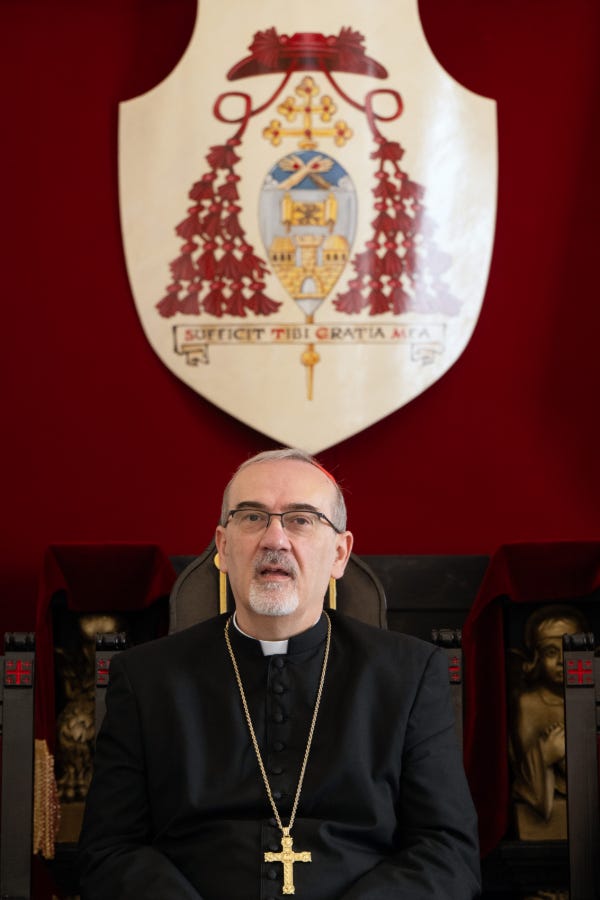
Does the support you receive from charities such as Aid to the Church in Need make a big difference?
Yes. It made a huge difference because the amounts we received were generous and they were directed to humanitarian help this time, more than other projects, because in a time of war the humanitarian basic needs are many. They go from food coupons to paying house rent to paying university tuition, or for hospitals and medicine.
Also there was another creative idea, which is to give work to people through offering them a provisional job they can do for six months and they receive a salary for that. This way, people are earning their living not through charity, but through their work, with dignity.
This project, which gives work to 300 people continues to be implemented. For some people it may be renewed. For others who may find work, they stop, they do another thing. But it saves many people from distress and misery.
Are Christians in the Holy Land receiving enough support from Catholics around the world?
I cannot say “enough” because every day the needs are increasing. But I can say that we are able to help most of the time.
I’ll give an example. If there’s someone who didn’t pay his rent for 18 months, really we cannot pay for 18 months. We may pay for five, six, seven months, hoping the owner of the house will accept this initial sum and wait for better times for this man. So we give partially, because if we want to give all that people ask for, we will not have enough.
What is your biggest struggle as a Christian leader in Jerusalem?
Our struggles are manifold. First, we have the immediate needs of the population. We remember the Gospel. Jesus not only preached the Gospel, but he also fed the 5,000 and he healed people.
And this is what the Church is doing. Not only teaching, preaching, forgiving, giving sacraments. We are a field church. We are a church in a field, not the sacristy. We have to reach people.
So the patriarch needed to go to Gaza two times during the war. He’s bringing aid when it is allowed. We have a humanitarian program. So we are not strangers to the community. And the community is not a stranger for us.
My WhatsApp is known by many people. I never changed my telephone number. When they need something, they write to me on WhatsApp. We are living among the people and for the people.
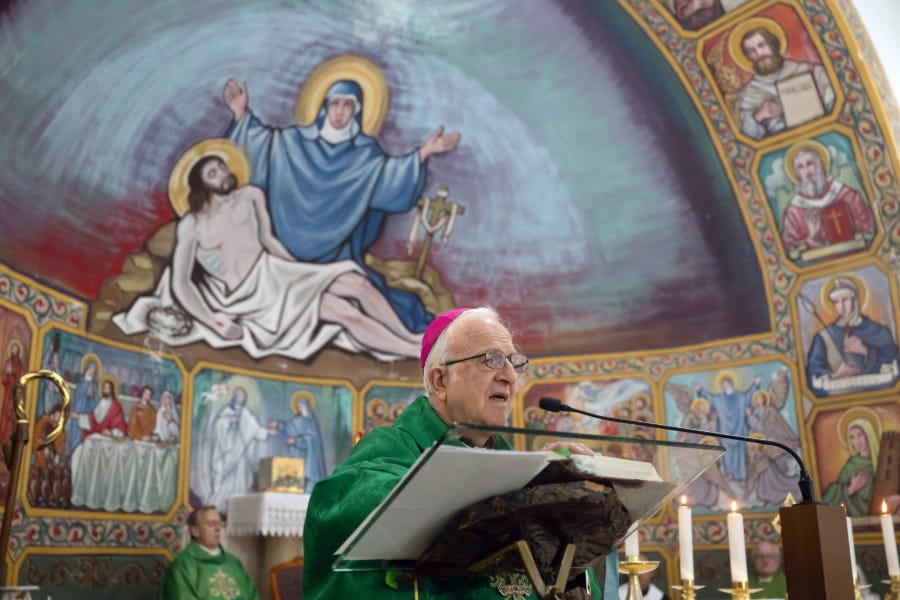
What’s the most important thing for Catholics outside of the Middle East to know about life today for Christians in the Holy Land?
That it’s a vibrant community. I attended a Mass on March 25 in a parish near Bethlehem consecrated to Our Lady of the Annunciation. On that day, the church was packed and I greeted people at the entrance of the church. They were joyful. They were grateful.
It seemed to me that they are one community, one family, and they love to meet each other. They spent one hour at Mass, but another hour in front of the church to talk, to chat, to connect.
One of the families who has a restaurant close to the church invited us to dinner, with the priest and the nuns and the family themselves. We went, we talked. It was very, very joyful.
The life of the Christian community in the Holy Land revolves around the church and the parish, because we have the school, we have a Catholic university in Bethlehem, we have the parish, and there are youth groups. So practically the parishes are still alive and are the center of the activity of our Christian community.
I ask Christians all over the world to continue to pray for the peace of Jerusalem because only the Lord can give us peace and change the mindset of politicians. He can convert the heart, from a heart of stone to a heart of flesh.
By experience we know only the Lord can draw good from evil. What is happening now is evil. War is evil. But the Lord can really give us positive things after this war and despite the war.



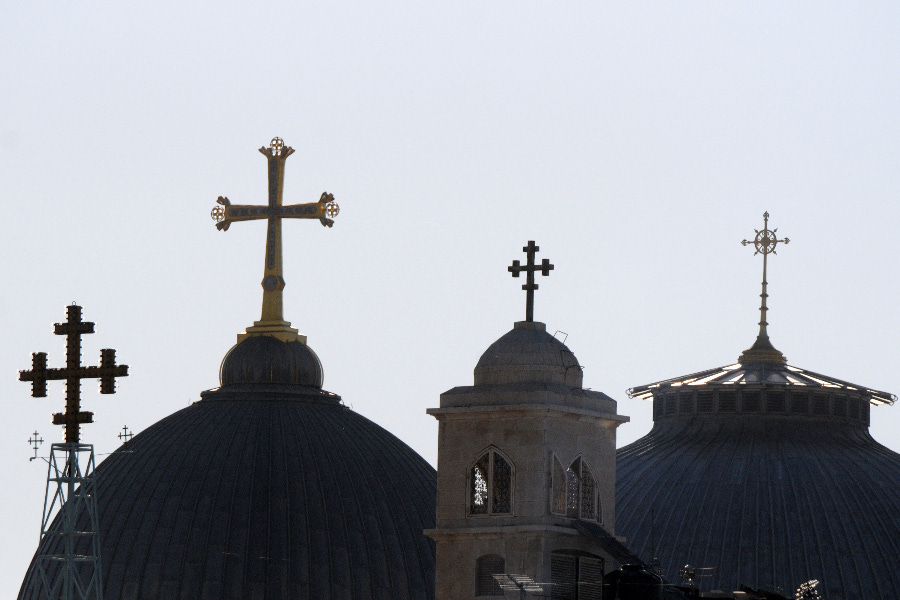
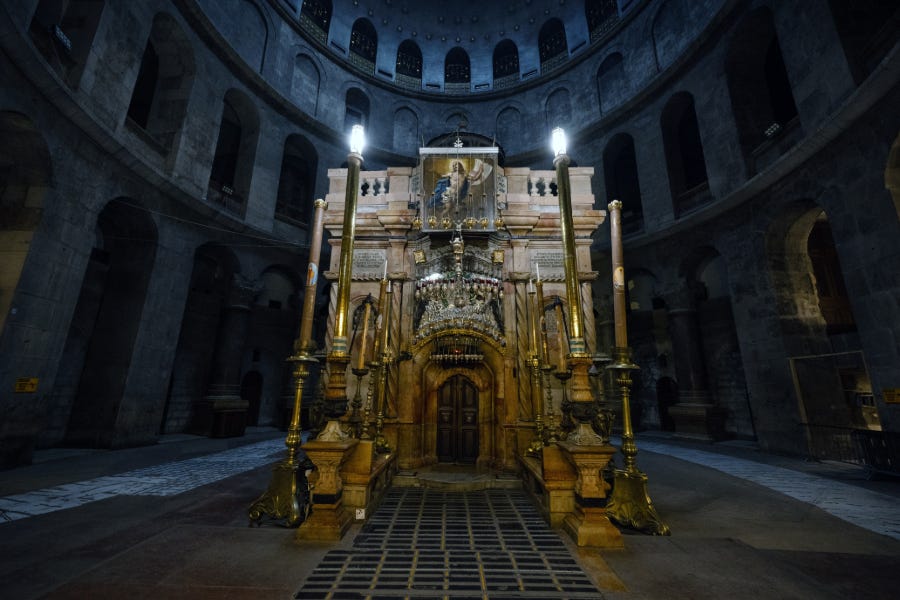







God bless Bishop Shomali and all the Christians of the Holy Land